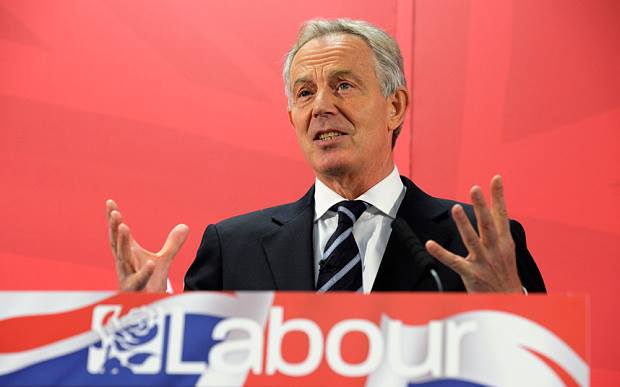The most notable thing about former British prime minister Tony Blair’s sudden reappearance in the United Kingdom’s domestic politics, with just under a month to go until a general election, is that no one particularly noticed his absence from domestic political matters.![]()
Unlike former US president Bill Clinton, who has balanced his financial and philanthropic activities with lingering, widespread popularity on the American political scene, Blair’s popularity diminished after he left 10 Downing Street. Still well-regarded abroad, Blair has offered his consulting services to leaders from Albania to Kazakhstan, and he’s become a wealthy man in the process, a much more controversial proposition for a former British prime minister than a former US president. Blair suffers further by contrast to his successor, Gordon Brown, who quietly receded from public view when he lost the premiership in 2010, resurfacing only to promote a dense policy book or to campaign full-heartedly against Scottish independence. There’s a sense that Brown hasn’t ‘cashed out’ the way that Blair did.
Though current prime minister David Cameron has attempted to blame both Blair and Brown for wasteful government spending as a prelude to his own government’s budget cuts, it is Blair’s role in the US-led invasion of Iraq that haunts his legacy. Blair only recently left his position as an envoy for the Middle East ‘quartet’ (the United States, the United Nations, the European Union and Russia), where his impact in the region has been negligible at best. Despite high hopes when he assumed the role shortly after leaving office, Blair is unlikely to lead any grand gestures in the Middle East.
* * * * *
RELATED: Analyzing the British leaders’ debate
RELATED: Scotland could easily hold the balance of power in Britain
* * * * *
Blair rode to victory in May 1997 on a landslide wave proclaiming the arrival of his center-oriented ‘New Labour.’ Though he capitalized then on a popular, youthful image, he is largely reviled in Great Britain today, as Sarah Ellison wrote in a scathing Vanity Fair profile earlier this year:
A man with aspirations to global leadership—even to global moral leadership—is now regarded by many of his countrymen as a shill for big corporations and deep-pocketed and dubious regimes. In terms of personal wealth, Blair is said to be worth an estimated £100 million ($150 million), a figure he denies. Today, Blair rarely makes public appearances in London. In 2010, he canceled a book party to celebrate the publication of his memoir, A Journey: My Political Life, to avoid the inevitable protests. Blair wasn’t invited to the wedding of Prince William and Kate Middleton in 2011. Last January, a London waiter attempted a citizen’s arrest of Blair for alleged war crimes arising from the invasion of Iraq.
Last month, two Labour candidates actually refused to accept £1000 donations from Blair, who had pledged £106,000 to candidates in marginal seats.
When Blair surfaced in domestic politics at all, it was usually to snipe at his successor as Labour Party leader, Ed Miliband, whose leadership campaign narrowly defeated his brother, David Miliband, the more Blairite alternative. As recently as January, Blair was obliquely warning Miliband to run to the center in advance of the May 7 general election, via an interview with The Economist:
“I am still very much New Labour and Ed would not describe himself in that way, so there is obviously a difference there,” Mr Blair says. “I am convinced the Labour Party succeeds best when it is in the centre ground”.
On other occasions, Blair tweaked Miliband for refusing to support Cameron’s ill-fated attempts to support anti-government rebels in the Syrian civil war.
Miliband, and advisers like former Labour leader Neil Kinnock, made it clear that Labour would move to a more full-throated leftism as an alternative to Cameron’s Tories. Moreover, Miliband’s shadow chancellor, Ed Balls, was a longtime Brown adviser, and would likely become the chancellor if Labour wins the election next month.
Blair, the most dominant Labour prime minister since perhaps Clement Atlee in the 1940s, is thrilled about none of this. There are also press reports that claim Blair has worked behind the scenes to undermine Miliband’s leadership in the past five years.
So it was a bit surprising to watch Blair’s abrupt return to Labour politics this week, with a speech designed to boost Miliband’s electoral chances by disparaging the political and business uncertainty that would follow a reelected Tory government — due mostly to the promised 2017 referendum on the country’s membership in the European Union. Blair, ever the herald for centrist, market-oriented government, appealed to the one constituency with which he still has credibility — the business community.
Blair’s point is devilishly simple. By wasting two years in the run-up to an uncertain referendum, Cameron has diverted precious government policymaking resources from more pressing issues like education, health care and the economy. The United Kingdom’s withdrawal from the European Union would be devastating economically, but the political uncertainty in the run-up to the referendum would also bring economic harm to the British economy.
His political skill in making the point is a reminder of why he won three consecutive British elections. But it’s not clear his statements were especially welcomed on the left or the right, and there’s evidence that Blair is the least popular living former prime minister.
Be that as it may, a Miliband victory would hollow out much of Blair’s project to drag the Labour Party to the ideological center. Derided by sober-minded Liberal Democrats as a war criminal, and taunted by the Tories for his business dealings, a Labour victory in 2015 would kick the last leg from Blair’s rapidly diminishing legacy.
